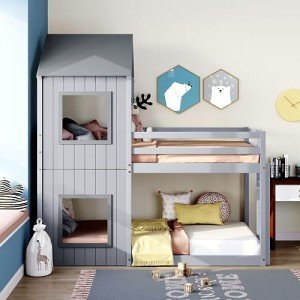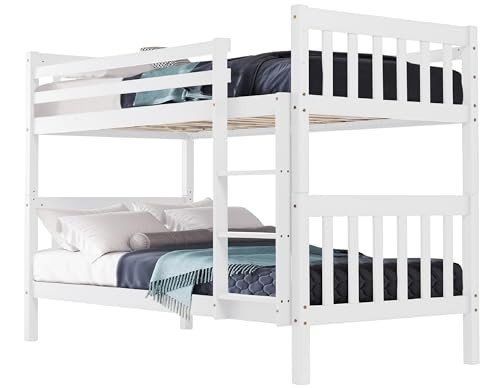
toddler_bunk_beds8513
About toddler_bunk_beds8513
Ten Bunk Beds Sales That Really Help You Live Better
Bunk Beds Sale: A Comprehensive Guide to Choosing the Right Bunk Bed for Your Home
Bunk beds have actually long been a staple in kids’s bedrooms, providing a combination of space-saving effectiveness and enjoyable. Whether accommodating siblings, good friends on slumber parties, or just making the most of a playroom, bunk beds have ended up being an important element in modern-day family homes. As sales on bunk beds rise, it becomes increasingly important for customers to make educated choices when purchasing one. This article will cover the fundamentals of acquiring a bunk bed, from types to safety functions, as well as suggestions for maintaining the integrity of your investment.

Kinds Of Bunk Beds
When thinking about a bunk bed sale, it’s essential to understand the different designs available on the marketplace. Below are the most typical types:
-
Traditional Bunk Beds: These include two beds stacked one above the other, sharing a single frame. They are typically the most economical option.
-
L-Shaped Bunk Beds: This design features one bed placed vertically and another horizontally. This plan develops additional space underneath the upper bed, which can be used for storage or a backyard.
-
Lofted Beds: Similar to traditional Bunk beds sales beds but without any lower bed. Instead, the space beneath can be utilized for a desk, play area, or additional storage.
-
Triple Bunk Beds: For families with a bigger number of children or regular sleepovers, triple bunk beds offer three sleeping locations in a space-efficient design.
-
Futon Bunk Beds: These designs combine bunk beds and futon couches. The bottom section transforms into a separate seating location, enhancing performance.
-
Convertible Bunk Beds: These beds can be separated into two private beds, making them flexible as children’s needs change with time.
Table 1: Comparison of Bunk Bed Types
| Type | Description | Space Efficiency | Additional Features |
|---|---|---|---|
| Traditional Bunk Bed | Two beds stacked vertically | High | Simplest design |
| L-Shaped Bunk Bed | One vertical and one horizontal bed | Moderate | Play or storage space |
| Lofted Bed | Raised bed with open space below | High | Work/play area |
| Triple Bunk Bed | Three stacked beds | Extremely High | Accommodates more users |
| Futon Bunk Bed | Bunk bed with a convertible futon | High | Multi-functional |
| Convertible Bunk Bed | Can be divided into two different beds | Moderate | Flexibility & & longevity |
Security Features to Consider
Safety is vital when purchasing a bunk bed. Below are crucial security features to try to find:
-
Guardrails: Adequate guardrails should be present on both sides of the upper bunk to avoid falls. They must be at least 5 inches greater than the mattress.
-
Ladder Design: Look for durable, large ladders with slip-resistant rungs. Make sure that the angle is not too high for simple gain access to.
-
Stability: Ensure the bed is constructed with strong products, such as strong wood or sturdy metal. The bed should not wobble when in use.
-
Weight Limit: Check the weight capacity of the bunk bed to guarantee it can accommodate the desired users securely.
-
Material Safety: If possible, choose beds made from non-toxic products or those meeting safety requirements for children’s furniture.
Table 2: Essential Safety Features
| Feature | Description | Importance |
|---|---|---|
| Guardrails | Sides of upper bed to prevent falls | Essential for child safety |
| Ladder Design | Strong, slip-resistant rungs | Help safe and easy access |
| Stability | Develop quality to prevent wobbling | Guarantees security and longevity |
| Weight Limit | Optimum weight capability | Prevents mishaps |
| Material Safety | Non-toxic, safe materials | Secures children’s health |
Maintenance Tips for Bunk Beds
To extend the life of your bunk bed and make sure continuous security, think about the following upkeep suggestions:
-
Regular Inspections: Periodically check the structure for loose screws, bolts, or any signs of wear. Tighten fasteners as necessary.
-
Tidy Periodically: Dust and clean the surfaces frequently. Usage appropriate cleaners that will not damage the surface.
-
Inspect Weight Limits: Be conscious of weight limitations, especially with older kids or adults who may want to utilize the upper bunk.
-
Avoid Climbing on Guardrails: Educate kids not to utilize guardrails for climbing or playing to reduce the danger of mishaps.
Frequently Asked Questions (FAQs)
Q1: What is the age limitation for children to securely use bunk beds?A: While it varies by the producer, lots of recommend that kids under 6 must not oversleep the upper bunk due to safety concerns.
Q2: How can parents prevent risky climbing?A: Setting clear guidelines about bunk bed use and monitoring children can help. In addition, using a bed tent can dissuade climbing up while creating a fun sleep environment.
Q3: What should I consider when decorating a space with bunk beds?A: Ensure there is sufficient space around the bunk bed for safe movement, and make use of the decoration to create customized spaces for each child.
Q4: Is a lofted bed suitable for older children?A: Yes, lofted beds can be ideal for older children as long as they fulfill security requirements and the kid is accountable enough to use them safely.
Bunk beds serve a functional function while adding an element of enjoyable to a child’s bedroom. As sales of bunk beds continue to rise, cautious consideration of types, safety functions, and maintenance practices is necessary for moms and dads and caretakers. By comprehending these crucial elements, families can find the best bunk bed for their home, guaranteeing both practicality and security for several years to come. Whether it’s for brother or sisters sharing a space or producing a comfortable sleepover space, a well-chosen bunk bed can provide delight and usefulness, making it a deserving financial investment.

No listing found.